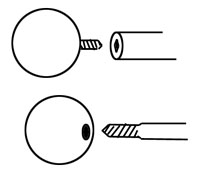Internally threaded: Difference between revisions
Jump to navigation
Jump to search
(Created page with "<html><div class="mw-content-ltr" dir="ltr" id="mw-content-text" lang="en"><div class="floatright"><a class="image" href="/index.php?title=File:Threading.jpg"><img alt="Threading.jpg" height="173" src="/images/f/f4/Threading.jpg" width="200"/></a></div> <p><a href="/index.php?title=Barbell" title="Barbell">Barbells</a> are attached to <a class="new" href="/index.php?title=Bead&action=edit&redlink=1" title="Bead (page does not exist)">beads</a> via threaded rods....") |
(Page conversion via llm-mediawiki-rev -jwm) |
||
| Line 1: | Line 1: | ||
[[File:Threading.jpg|thumb|right|200px]] | |||
[[:Barbell|Barbells]] are attached to [[Bead|beads]] via threaded rods. How they attach can vary. | |||
There are two main kinds of '''threading''' used in the [[:Body modification|body modification]] industry. The top drawing shows an internally threaded barbell, where the bead screws into the bar. The bottom drawing shows an externally threaded barbell, where the bar screws into the bead. A subtype of external threading is step-down threading, where the threaded portion is of a smaller gauge than the main stem of the barbell - this can help prevent the threads catching on the [[Fistula|fistula]] during insertion. | |||
Latest revision as of 05:58, 17 September 2023
Barbells are attached to beads via threaded rods. How they attach can vary.
There are two main kinds of threading used in the body modification industry. The top drawing shows an internally threaded barbell, where the bead screws into the bar. The bottom drawing shows an externally threaded barbell, where the bar screws into the bead. A subtype of external threading is step-down threading, where the threaded portion is of a smaller gauge than the main stem of the barbell - this can help prevent the threads catching on the fistula during insertion.
